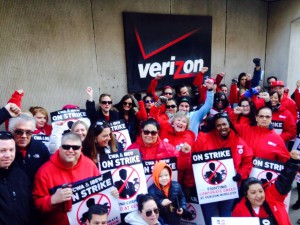The author is a member of the International Brotherhood of Teamsters, which is instructing its members to show solidarity by refusing to cross a CWA Verizon picket line.
At 6 a.m. on April 13, 2016, 39,000 Verizon workers went on strike. Verizon workers, who are members of the Communications Workers of America and the International Brotherhood of Electrical Workers, struck after working months without a contract. Verizon has refused to budge on demanding concessions of its employees despite making $1.8 billion of profit per month.
It is a familiar story for tens of thousands of employees who went on strike in 2011. Negotiations for a new collective bargaining agreement began on June 22, 2015, and has continued since the contract expired on August 1.
The concessions that Verizon is demanding include outsourcing more line work to low wage contractors, health care cuts for retirees, forcing workers to accept out of town assignments for up to two months at a time and offshoring call center jobs.
Giving in to the concessions would erode the gains the workers have won over the past 50 years. Verizon has made $39 billion in profits over the past three years, with $44 million going to the top five executives and $18 million to CEO Lowell McAdam in 2014.
It is a scenario played out all too frequently in the United States under capitalism. Corporations constantly want more out of their workers in exchange for less. Verizon does not want to pay union rates for line work. Instead they would prefer to cut jobs and outsource work to low wage contractors. This sharp demand in outsourcing particularly affects installing and maintained telephone poles.
In addition to nearly 40,000 workers on strike, Verizon is proposing increasing the cost of medical benefits for 80,000 retirees to the same rate as current employees. Retirees have been leading pickets across a variety of job sites throughout the contract negotiations.
The company wants to be able to send workers anywhere from Massachusetts to Virginia for up to two months at a time. This sharp sticking point forces workers to choose between their job or their family. Despite already cutting costs by relocating 5,000 jobs to Mexico, the Philippines and the Dominican Republic, the company wants to export more call centers to oversee locations at the expense of union jobs.
With $249 million, Verizon could have expanded FiOS—their fiber-optic communication network—to Baltimore, Albany, Syracuse, Buffalo, Scranton, Wilmington and Roanoke. This would have secured good jobs and provided the choice of FiOS to 1.3 million people. Instead, between 2010 and 2014, Verizon used that $249 million to pay top executives.
But, workers are not standing for it. Stand Up to Verizon has organized pickets and rallies throughout the northeastern U.S. Strikers in New York City will be marching across the Brooklyn Bridge to the Democratic Party’s debate on April 14 to bring attention to their struggle. The Communication Workers of America are also planning a mass strike rally in Manhattan on April 18.
Verizon is not a special case. Under capitalism, it is normal for corporate executives to take home hundreds of times more money than the workers who actually create the all wealth. The Party for Socialism and Liberation stands in full solidarity with the striking Verizon workers and for the creation of a new socialist system where the wealth that workers create benefits all of society instead of just a tiny elite.






